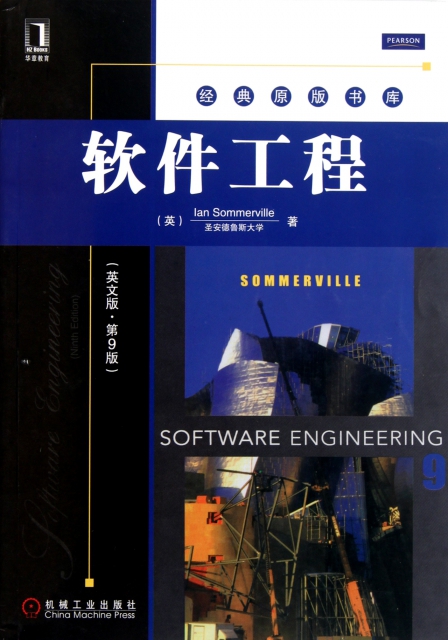| | | | 軟件工程(英文版第9版)/經典原版書庫 | | 該商品所屬分類:計算機/網絡 -> 軟件工程 | | 【市場價】 | 896-1299元 | | 【優惠價】 | 560-812元 | | 【介質】 | book | | 【ISBN】 | 9787111348252 | | 【折扣說明】 | 一次購物滿999元台幣免運費+贈品
一次購物滿2000元台幣95折+免運費+贈品
一次購物滿3000元台幣92折+免運費+贈品
一次購物滿4000元台幣88折+免運費+贈品
| | 【本期贈品】 | ①優質無紡布環保袋,做工棒!②品牌簽字筆 ③品牌手帕紙巾
|
|
| 版本 | 正版全新電子版PDF檔 | | 您已选择: | 正版全新 | 溫馨提示:如果有多種選項,請先選擇再點擊加入購物車。*. 電子圖書價格是0.69折,例如了得網價格是100元,電子書pdf的價格則是69元。
*. 購買電子書不支持貨到付款,購買時選擇atm或者超商、PayPal付款。付款後1-24小時內通過郵件傳輸給您。
*. 如果收到的電子書不滿意,可以聯絡我們退款。謝謝。 | | | |
| | 內容介紹 | |

-
出版社:機械工業
-
ISBN:9787111348252
-
作者:(英)薩默維爾
-
頁數:773
-
出版日期:2011-06-01
-
印刷日期:2011-06-01
-
包裝:平裝
-
開本:16開
-
版次:1
-
印次:1
-
《軟件工程(英文版第9版)》由lan Sommervile所著,是繫統介紹軟件工程理論的經典教材,自1982年初版以來,隨著軟件工程學科的發展不斷*新,影響了一代又一代軟件工程人纔,對學科本身也產生了積極影響。全書共四個部分,完整討論了軟件工程各個階段的內容,是軟件工程和繫統工程專業本科生和研究生的**教材,也是軟件工程師**的參考書籍。
-
《軟件工程(英文版第9版)》由lan Sommervile所著,本書特點
·涵蓋了對所有開發過程都很基礎的重要主題,包括軟件工程理論與實
踐的最新進展。
·將第8版中的八篇內容重構為四個部分,使教師講授軟件工程課程更
加容易。
·每一章都有30%~40%的更新,增加了敏捷軟件開發和嵌入式繫統等新
章,補充了模型驅動工程、開源開發、測試驅動開發、可依賴繫統體繫結構
、靜態分析和模型檢查、cots復用、服務作為軟件以及敏捷規劃等新內容。
·著重討論了開發可靠的分布式繫統的相關主題以及敏捷方法和軟件復
用。
·反映敏捷方法先進性的同時,不忘強調傳統的計劃驅動軟件工程的作
用,闡述了兩者結合構建優秀軟件繫統的重要性。
·以一個新的病人記錄繫統案例研究貫穿始終,繫統、完整地講解軟件
工程的各個方面。
·設計為“印刷/web”相結合的方式,核心信息采用印刷版本,教輔材
料及先前版本中的一些章節放在web上,為讀者提供豐富翔實的信息。
-
preface v
part 1 introduction to software engineering 1
chapter 1 introduction 3
1.1 professional software development 5
1.2 software engineering ethics 14
1.3 case studies 17
chapter 2 software processes 27
2.1 software process models 29
2.2 process activities 36
2.3 coping with change 43
2.4 the rational unified process 50
chapter 3 agile software development 56
3.1 agile methods 58
3.2 plan-driven and agile development 62
3.3 extreme programming 64
3.4 agile project management 72
3.5 scaling agile methods 74
chapter 4 requirements engineering 82
4.1 functional and non-functional requirements 84
4.2 the software requirements document 91
4.3 requirements specification 94
4.4 requirements engineering processes 99
4.5 requirements elicitation and analysis 100
4.6 requirements validation 110
4.7 requirements management 111
chapter 5 system modeling 118
5.1 context models 121
5.2 interaction models 124
5.3 structural models 129
5.4 behavioral models 133
5.5 model-driven engineering 138
chapter 6 architectural design 147
6.1 architectural design decisions 151
6.2 architectural views 153
6.3 architectural patterns 155
6.4 application architectures 164
chapter 7 design and implementation 176
7.1 object-oriented design using the uml 178
7.2 design patterns 189
7.3 implementation issues 193
7.4 open source development 198
chapter 8 software testing 205
8.1 development testing 210
8.2 test-driven development 221
8.3 release testing 224
8.4 user testing 228
chapter 9 software evolution 234
9.1 evolution processes 237
9.2 program evolution dynamics 240
9.3 software maintenance 242
9.4 legacy system management 252
part 2 dependability and security 261
chapter 10 sociotechnical systems 263
10.1 complex systems 266
10.2 systems engineering 273
10.3 system procurement 275
10.4 system development 278
10.5 system operation 281
chapter 11 dependability and security 289
11.1 dependability properties 291
11.2 availability and reliability 295
11.3 safety 299
11.4 security 302
chapter 12 dependability and security specification 309
12.1 risk-driven requirements specification 311
12.2 safety specification 313
12.3 reliability specification 320
12.4 security specification 329
12.5 formal specification 333
chapter 13 dependability engineering 341
13.1 redundancy and diversity 343
13.2 dependable processes 345
13.3 dependable system architectures 348
13.4 dependable programming 355
chapter 14 security engineering 366
14.1 security risk management 369
14.2 design for security 375
14.3 system survivability 386
chapter 15 dependability and security assurance 393
15.1 static analysis 395
15.2 reliability testing 401
15.3 security testing 404
15.4 process assurance 406
15.5 safety and dependability cases 410
part 3 advanced software engineering 423
chapter 16 software reuse 425
16.1 the reuse landscape 428
16.2 application frameworks 431
16.3 software product lines 434
16.4 cots product reuse 440
chapter 17 component-based software engineering 452
17.1 components and component models 455
17.2 cbse processes 461
17.3 component composition 468
chapter 18 distributed software engineering 479
18.1 distributed systems issues 481
18.2 client–server computing 488
18.3 architectural patterns for distributed systems 490
18.4 software as a service 501
chapter 19 service-oriented architecture 508
19.1 services as reusable components 514
19.2 service engineering 518
19.3 software development with services 527
chapter 20 embedded software 537
20.1 embedded systems design 540
20.2 architectural patterns 547
20.3 timing analysis 554
20.4 real-time operating systems 558
chapter 21 aspect-oriented software engineering 565
21.1 the separation of concerns 567
21.2 aspects, join points and pointcuts 571
21.3 software engineering with aspects 576
part 4 software management 591
chapter 22 project management 593
22.1 risk management 595
22.2 managing people 602
22.3 teamwork 607
chapter 23 project planning 618
23.1 software pricing 621
23.2 plan-driven development 623
23.3 project scheduling 626
23.4 agile planning 631
23.5 estimation techniques 633
chapter 24 quality management 651
24.1 software quality 655
24.2 software standards 657
24.3 reviews and inspections 663
24.4 software measurement and metrics 668
chapter 25 configuration management 681
25.1 change management 685
25.2 version management 690
25.3 system building 693
25.4 release management 699
chapter 26 process improvement 705
26.1 the process improvement process 708
26.2 process measurement 711
26.3 process analysis 715
26.4 process change 718
26.5 the cmmi process improvement framework 721
glossary 733
subject index 749
author index 767
| | |
| | | | |
|




